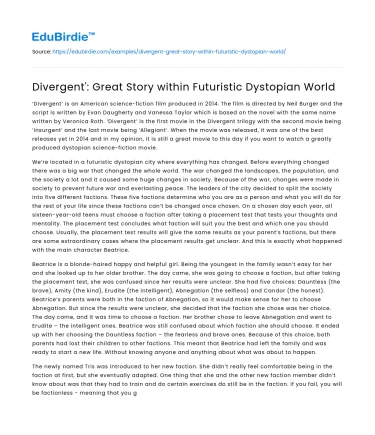Introduction
"Divergent," a novel by Veronica Roth, presents a captivating story set within a futuristic dystopian society. The narrative explores themes of identity, societal structure, and personal choice against a backdrop of a rigidly divided community. This fictional world is predicated on the notion that humanity's survival depends on the categorization of individuals into distinct factions, each embodying a particular virtue. Roth's work offers a profound commentary on the consequences of extreme societal segmentation and the inherent struggle for individuality within constrained environments. The novel's protagonist, Tris Prior, embarks on a journey of self-discovery, challenging the status quo and revealing the inherent flaws in a seemingly utopian society. This essay explores the intricate narrative of "Divergent" within its dystopian setting, examining its thematic depth, character development, and the broader implications of its societal critique. Through a comprehensive analysis, this essay aims to elucidate the novel's enduring relevance and its reflection of contemporary societal issues.
Thematic Exploration in a Dystopian Society
"Divergent" is a narrative rich with thematic exploration, addressing the complexities of identity and societal structure within a dystopian framework. The division of society into factions—Abnegation, Amity, Candor, Dauntless, and Erudite—serves as a microcosm for examining the human inclination to categorize and segregate. This faction system is designed to maintain peace by assigning individuals to groups that align with their dominant traits, ostensibly reducing conflict. However, Roth critiques this system, illustrating its inherent flaws through the protagonist's experiences. Tris, who is initially classified as a divergent, embodies multiple traits, thus defying the societal norm of singular categorization. Her journey underscores the tension between individuality and conformity, a critical theme that resonates with modern audiences facing similar societal pressures.
Save your time!
We can take care of your essay
- Proper editing and formatting
- Free revision, title page, and bibliography
- Flexible prices and money-back guarantee
The novel’s dystopian setting amplifies the exploration of these themes, providing a stark contrast between the idealized vision of societal harmony and the reality of oppression and control. As Tris navigates her world, she encounters various forms of resistance and rebellion, symbolizing the universal struggle for autonomy and self-definition. Roth’s portrayal of a fractured society serves as a cautionary tale, warning against the dangers of rigid categorization and the loss of personal freedoms. This thematic exploration is further enriched by Roth’s use of vivid imagery and symbolism, effectively conveying the protagonist’s internal and external conflicts. The narrative’s focus on personal choice and moral ambiguity challenges readers to reflect on their own societal roles and the impact of their choices within a broader context.
Character Development and Societal Critique
The development of Tris Prior as a character is central to "Divergent," providing a lens through which the societal critique is articulated. Tris’s evolution from a passive member of the Abnegation faction to a defiant insurgent highlights the transformative power of self-awareness and courage. Her character arc is marked by a series of trials that test her resolve and force her to confront the limitations imposed by her society. Through Tris, Roth examines the psychological impact of living in a dystopian world, where fear and control are pervasive. The protagonist's inner turmoil and eventual rebellion reflect a broader critique of authoritarian regimes and the suppression of individual freedoms.
Roth's narrative also critiques the notion of societal perfection, exposing the hypocrisy and corruption within the faction system. The Erudite faction’s pursuit of intellectual supremacy, for instance, reveals the dangers of unchecked ambition and the devaluation of other virtues. This critique is mirrored in real-world scenarios, where societal structures often prioritize certain traits or abilities over others, leading to inequality and discontent. The novel’s depiction of factional conflicts and power struggles serves as an allegory for contemporary political and social issues, inviting readers to question the validity of rigid social constructs and the true nature of progress.
Counter-Arguments and Narrative Complexity
While "Divergent" has been lauded for its engaging storyline and thematic depth, some critics argue that the novel’s portrayal of a dystopian society is overly simplistic and lacks originality. They contend that the faction-based system is reminiscent of other dystopian works, such as Suzanne Collins' "The Hunger Games," which also explores themes of societal division and rebellion. However, Roth's narrative distinguishes itself through its intricate character development and the nuanced exploration of identity. The concept of divergence itself introduces a layer of complexity, challenging the binary notions of good and evil prevalent in many dystopian narratives.
Moreover, Roth’s focus on personal choice and moral dilemmas adds depth to the story, encouraging readers to engage with the characters and their struggles on a more intimate level. The novel’s emphasis on the psychological aspects of control and conformity provides a fresh perspective on the dystopian genre, highlighting the internal conflicts faced by individuals in oppressive environments. By addressing these counter-arguments, it becomes evident that "Divergent" offers a unique contribution to the genre, blending familiar dystopian elements with innovative storytelling and character dynamics.
Conclusion
In conclusion, "Divergent" presents a compelling narrative set within a meticulously crafted dystopian world. Through its exploration of identity, societal structure, and personal choice, the novel offers a profound critique of rigid social systems and the consequences of conformity. Tris Prior's journey of self-discovery and rebellion serves as a powerful reminder of the importance of individuality and the human spirit's resilience in the face of adversity. Despite criticisms of its thematic similarities to other dystopian works, "Divergent" distinguishes itself through its complex characters and nuanced storytelling. The novel's enduring relevance lies in its ability to reflect contemporary societal issues and challenge readers to reconsider their own roles within a structured society. As a work of speculative fiction, "Divergent" not only entertains but also provokes thought and introspection, solidifying its place as a significant contribution to the dystopian genre.






 Stuck on your essay?
Stuck on your essay?

